Jack Woodley murder: Appeal court told Newcastle judge 'failed'
- Published

Jack Woodley was stabbed to death in Houghton-le-Spring
A crown court judge "failed" to be fair during the trial of 10 youths found guilty of murdering an 18-year-old, the Court of Appeal has heard.
Jack Woodley died from a single stab wound in a group attack in Houghton-le-Spring in October 2021.
Ten boys aged between 14 and 18 at the time were found guilty of murder at Newcastle Crown Court on 1 June 2022.
Lawyers representing the youths told the court a two-week break and comments the judge made had harmed the case.
Leonard Smith KC, representing 19-year-old Grant Wheatley, said His Honour Judge Rodney Jameson KC had a "difficult task" in summing up the "10-defendant case" but "we regretfully say for different reasons he failed in that task".
Seven of the youths, including the-then 15-year-old who stabbed Mr Woodley, cannot be identified but three can now be named after turning 18, namely Wheatley, Clayton Owen, 19, and Sonny Smith, 18.
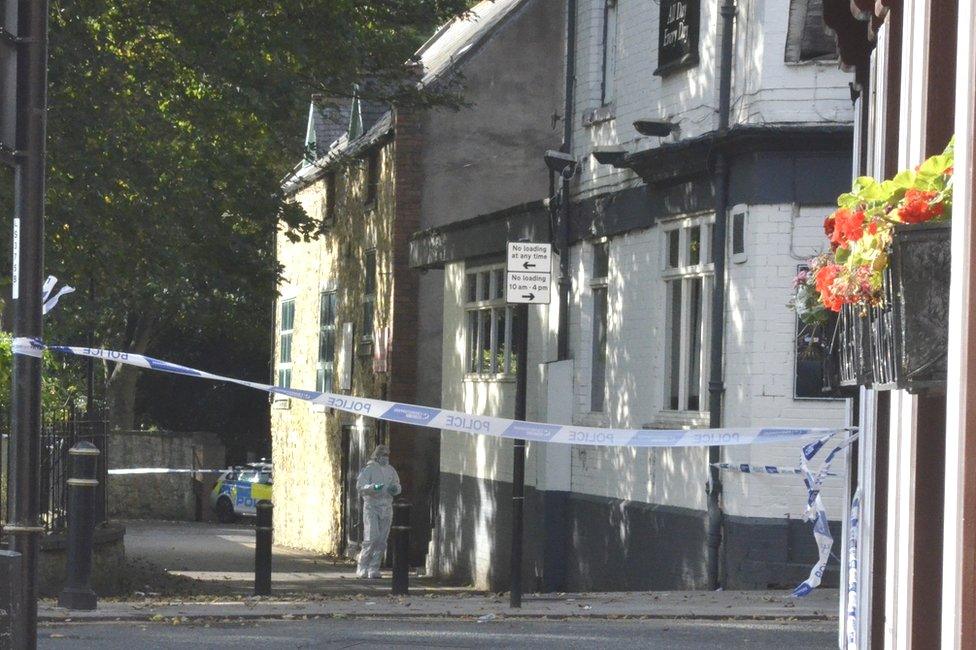
Mr Woodley died in hospital a day after being attacked near the Britannia Inn in Houghton-le-Spring
Leonard Smith said it had been a "very emotional trial" and no-one, including seasoned barristers, would forget the moment the guilty verdicts were given.
He said the trial began on 14 March with a two-week break scheduled from 9 May.
After the evidence phase had concluded on 21 April, jurors heard closing speeches from the prosecution and defence lawyers before the judge summed up the case.
Mr Smith said the last time jurors heard from the barristers was on 6 May, with them not being sent out to start their deliberations until Friday 27 May and the verdicts were reached the following Wednesday.
Mr Smith said in his summing up of Wheatley's case, the judge "crossed the boundary" from being an impartial and "neutral umpire" into offering an opinion that damaged jurors' views of the defendant.
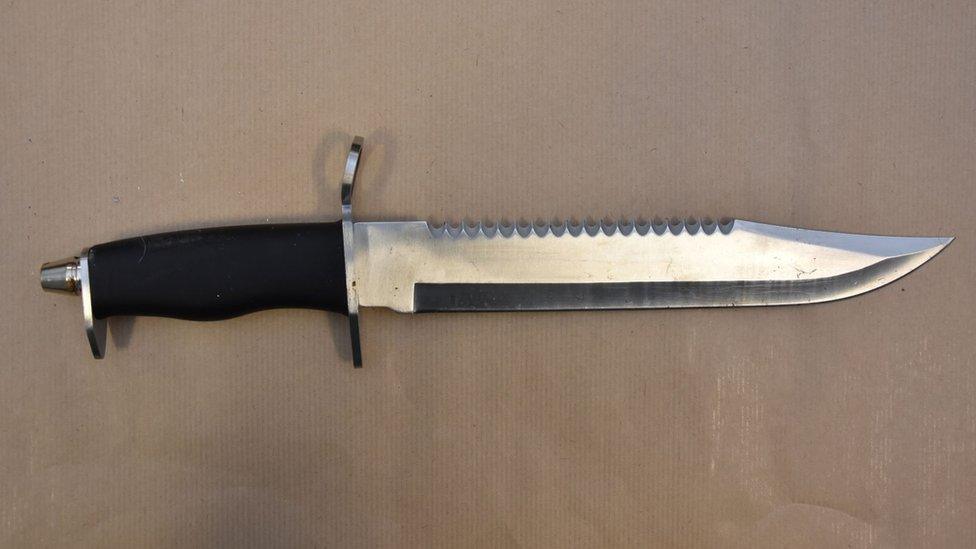
One of the 10 defendants admitted stabbing Mr Woodley with a 9in (25cm) knife but claimed it was an accident
Wheatley told the jury he threw two punches in the melee after seeing one of the other youths - a friend who started the attack on Mr Woodley - "in trouble", but in his statement submitted ahead of the trial the defendant never mentioned self defence or defence of others.
The judge told jurors because the self-defence claim was missing from the statement drawn up by his lawyers, they were "entitled to conclude it is something he has made up since", adding it was up to the jury to decide whether that was correct.
Mr Smith said that was the "last thing" jurors heard in relation to Wheatley and that the judge "conveyed the clear impression" that nobody but Wheatley believed he acted in reasonable defence.
'Inelegant but understandable'
Nicholas Lumley KC, representing the-then 15-year-old, now aged 16, who stabbed Mr Woodley, said the judge summed up the boy's case three-and-a-half weeks after jurors heard the defence's closing statement but was "silent" on important parts.
He said the judge mentioned the 2.7in (7cm) deep wound but not "why it was important", namely the defence's case the blade was much bigger so if the boy had intended to kill Mr Woodley it would have caused a deeper injury.
Mr Lumley said the prosecution and judge also "seized" on the boy's use of the word "accidental" when the youth explained the stabbing to jurors.
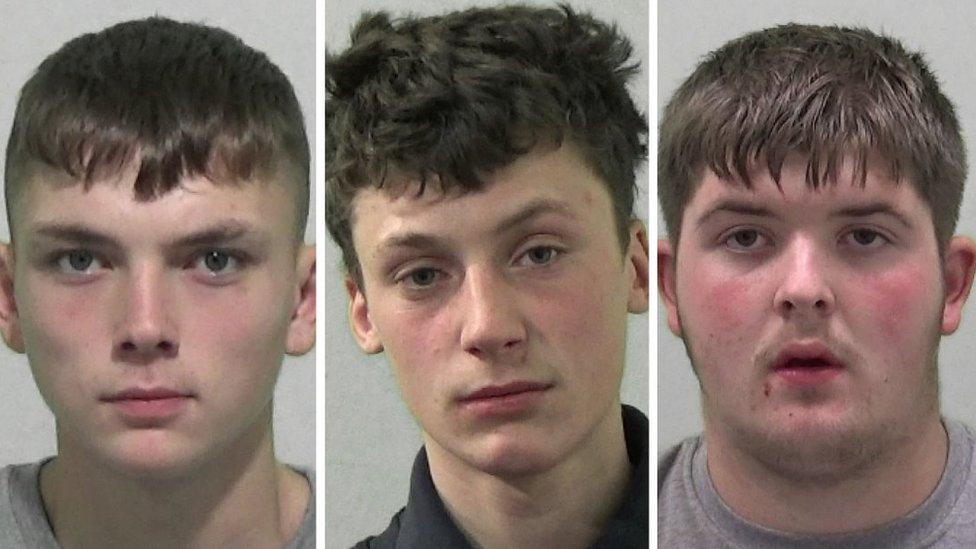
Three of the convicted murderers can now be identified as Sonny Smith, Clayton Owen and Grant Wheatley
He said his side made the case the boy's phrasing was "inelegant" and "undoubtedly an unfortunate way of expressing things" but was "understandable" given he was a 15-year-old giving evidence in a court full of adults.
Finally, Mr Lumley said the judge failed to repeat the defence side's points that after he realised he had stabbed Mr Woodley, the youth fled and took no further part in the continuing attack which, he said, spoke to the boy's intent to actually harm the 18-year-old.
Appeal judges said the judge told jurors he was giving a "thumbnail sketch" rather than a full recap of the whole defence statement, but Mr Lumley said it should have been a fuller recount.
'Impact waned'
David Lamb KC, representing the-then 16-year-old, now aged 17, who threw the first punch at Mr Woodley, said the judge intervened with a "degree of hostility" when the youth was giving evidence.
The boy was asked by prosecutor Mark McKone KC if he would have kicked Mr Woodley in the head to which the youth replied: "I don't know, I might have, I might not have."
The judge then asked the boy if he realised what he had just said, which Mr Lamb said implied the youth had made a significant admission.
But, Mr Lamb said, the judge did not then ask the boy, who had the "vulnerability of a young defendant" if he was mistaken.
Mr Lamb said he later asked the boy if he had kicked anyone to which the boy replied "no I never", but the judge did not remind jurors of that, adding the judge had missed the "important and salient" parts.
Toby Hedworth KC, representing Sonny Smith, said because of the long delay, the impact of the lawyers' closing statements on jurors would have "waned" and the judge's summing up would therefore have had a "greater impact".
He said the judge did not do an "analysis of the issues" in Sonny Smith's case and the thumbnail did "not properly put before the jury" the defendant's argument.
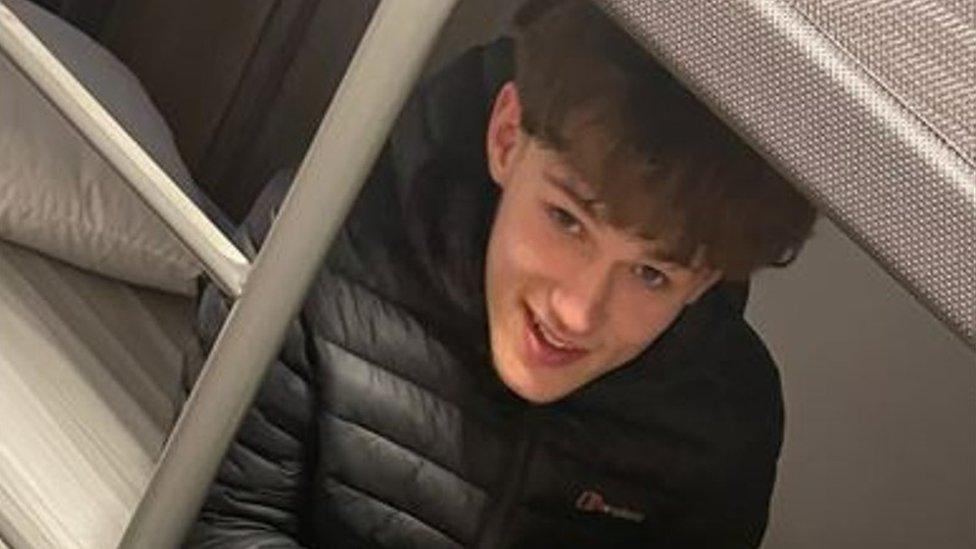
Jack Woodley was repeatedly punched, kicked and stamped upon before being stabbed
Dapinder Singh KC, representing a boy who was 14 at the time of the attack but is now 15, said the need for thumbnail sketches to be "balanced and fair" was "particularly acute after any form of delay".
He said the "net effect" of the judge's summing up had been to "destroy the credibility" of the boy's case and "confused" the jury.
He said the judge was biased towards the prosecution and "dismissed" efforts to correct him, adding the summing up was "unfair" and "inaccurate".
Kama Melly KC, representing a boy who was 14 when the attack happened and 16 now, echoed the concerns about the judge's summing up.
She said it was a "vast" and "factually complex" case but, given the "significant gap in time" between the evidence ending and the jury starting their deliberations, the judge's summing up "was not in as much detail as the case demanded".
Peter Wilcock KC, representing a 16-year-old who was 14 at the time of attack, said comments made by the judge created "fundamental unfairness" towards the youth and the jury were "misled".
He said the judge placed an "undue amount of importance" on one part of the boy's case to the detriment of the rest of his defence.
Mr Wilcock said the youth had been convicted of murder as a "secondary party" in the "dynamic and confusing" 84-second melee even though not a single "independent" witness saw him use violence towards Mr Woodley and nothing had been caught on CCTV or mobile phone footage.
'Hood up'
Alistair Macdonald KC, representing a 17-year-old who was 15 at the time, said no witness reported the youth being involved and three of his co-accused said he had "nothing to do with it".
He said the boy was arrested a month after the killing because he was one of multiple youths seen in the melee in a short mobile phone video shot by a teenage girl.
Mr Macdonald said the case against the youth shouldn't have proceeded as he was brought in on a "false basis" with the prosecution case against him changing substantially between him being charged and the trial.
He said it was accepted the boy had his hood up but there was "no evidence" to support the judge's comments that the boy put his hood up after discussion with the others to disguise themselves.
"The judge failed to take account of the fact it was an October night," Mr Macdonald said, adding numerous teenagers including Mr Woodley had their hoods up.
He said the judge also placed "reliance and significance" on the fact that nobody tried to "stop the violence" but that "fails to take into account this was a fast-moving and shocking incident involving a significant number of young people", many of whom were "not engaged in unlawful violence".
Robert Woodcock KC, representing a 17-year-old boy who was 15 at the time, said the timetable of the trial had been "much criticised" and because of the large break, it was "incumbent" on the judge to "do more than he did".
Mr Woodcock said his client had been trying to pull Mr Woodley away from the fighting without realising it was the victim he had grabbed and there was "no evidence" to contradict that.
He said the boy "had not had a fair trial" and therefore his "conviction was unsafe".
'Negative impression'
Caroline Goodwin KC, representing Clayton Owen, said the only evidence against him was that he had a hat like one caught on footage from the scene.
He was one of four of the accused who declined to give evidence at the trial and Ms Goodwin said that in his thumbnail sketch of Owen, the judge had emphasised points "without balance".
She said the judge's comments were the "last words" the jury heard about Owen, with the 45-minute long defence speech having been made almost a month before, and the "tone and content" may have given the jury a "contrary and negative impression" of the teenager.
On behalf of the prosecution, Mr McKone said it was incumbent on the judge to give "a balanced summing up whether there was a delay or not" and his side did not accept Judge Jameson had been unfair.
He said the case had to be seen in the context of a "boy being unlawfully killed during a group attack".
Mr McKone said some of the defendants "told admitted lies", many "claimed to have a poor memory" and four did not give evidence so it was "inevitable that a fair and accurate summing up would sometimes give the impression of a strong prosecution case".
He said the "huge size of the knife" meant it was "almost inevitable" the jury would find the boy with it had "intended to cause at least really serious harm" to Mr Woodley.
Appeal judges Lord Justice Tim Holroyde, Mr Justice David Foxton and Sir Nigel Davis said they would reserve their judgement to a future date as each case would need "careful and separate attention".

Follow BBC North East & Cumbria on Twitter, external, Facebook, external and Instagram, external. Send your story ideas to northeastandcumbria@bbc.co.uk, external.
Related topics
- Published5 August 2022

- Published1 June 2022

- Published1 June 2022
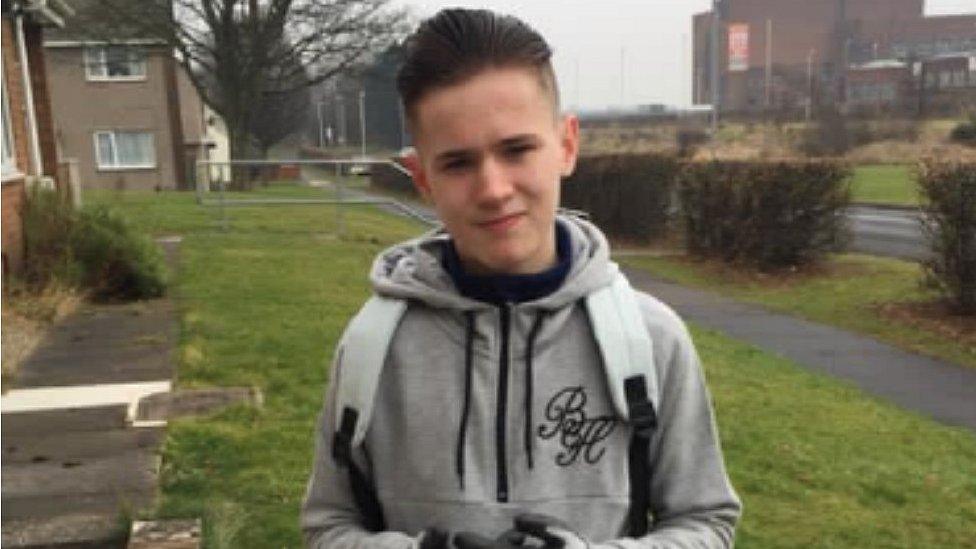
- Published19 January 2023
